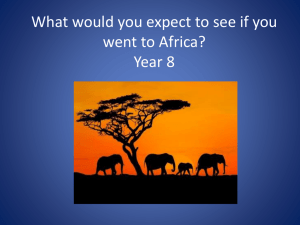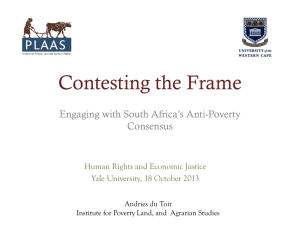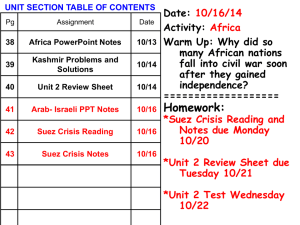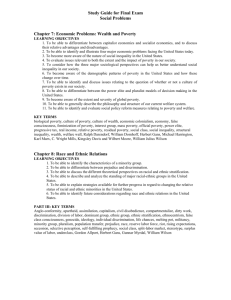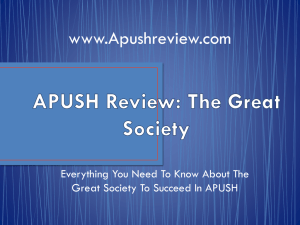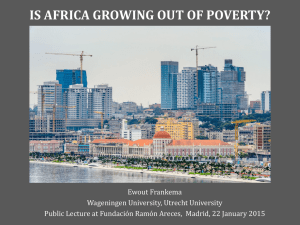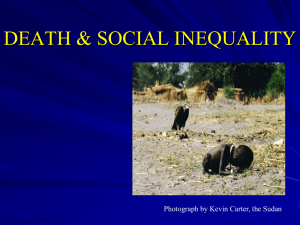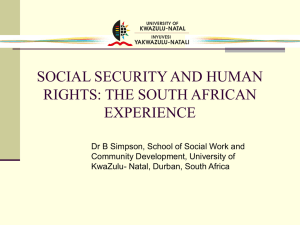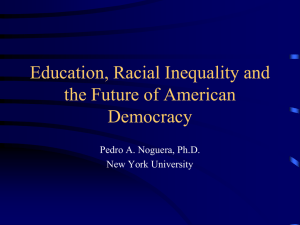Speech delivered by Justice Pius Langa, Chief Justice of South Africa
advertisement
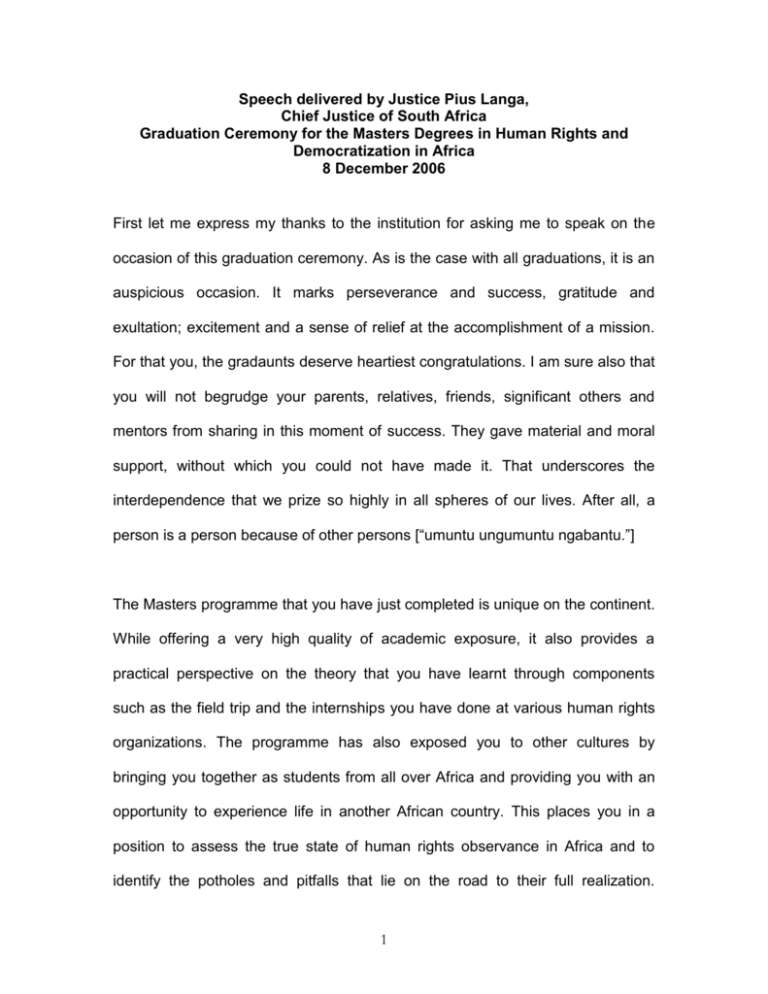
Speech delivered by Justice Pius Langa, Chief Justice of South Africa Graduation Ceremony for the Masters Degrees in Human Rights and Democratization in Africa 8 December 2006 First let me express my thanks to the institution for asking me to speak on the occasion of this graduation ceremony. As is the case with all graduations, it is an auspicious occasion. It marks perseverance and success, gratitude and exultation; excitement and a sense of relief at the accomplishment of a mission. For that you, the gradaunts deserve heartiest congratulations. I am sure also that you will not begrudge your parents, relatives, friends, significant others and mentors from sharing in this moment of success. They gave material and moral support, without which you could not have made it. That underscores the interdependence that we prize so highly in all spheres of our lives. After all, a person is a person because of other persons [“umuntu ungumuntu ngabantu.”] The Masters programme that you have just completed is unique on the continent. While offering a very high quality of academic exposure, it also provides a practical perspective on the theory that you have learnt through components such as the field trip and the internships you have done at various human rights organizations. The programme has also exposed you to other cultures by bringing you together as students from all over Africa and providing you with an opportunity to experience life in another African country. This places you in a position to assess the true state of human rights observance in Africa and to identify the potholes and pitfalls that lie on the road to their full realization. 1 Hopefully, it equips you to identify solutions to the vast challenges that still lie ahead. With that in mind, my speech will touch on the main challenges, as I see them, to the realization of human rights in Africa, and give some tentative suggestions about how some of these issues can be addressed. The objective is to enlist you, today’s graduands, to be committed corps, to espouse the programme towards Africa’s reconstruction and recovery. The objective is to put the observance of human rights where it belongs: at the fore-front of our list of priorities for the continent. Why this pre-occupation with human rights? The Amnesty International Report 2006, in its global overview, tells us that “[t]he year 2005 posed some major challenges for governments: intractable conflicts, terrorist attacks, the relentless spread of the HIV/Aids pandemic, the persistence of widespread extreme poverty and natural disasters. These challenges should have been met with responses based on human rights principles. All too often they were not. Individually and collectively, governments continued to pursue policies that often sacrificed human rights for political or economic expediency.”1 Elsewhere, the report refers to the commitment by the international community to “make poverty history”. It points out that while government leaders pronounced their intention to reduce poverty, particularly in Africa, most of the targets set under the UN’s 15-year Millennium Development Goals, showed little, if any prospect of being met. 1 Global Overview at page p7. 2 Turning specifically to Africa, the report complains of the continuing perpetration of grave human rights violations, including killings, rape and other forms sexual violence. It states that “[m]illions of men, women and children remained impoverished and deprived of clean water, adequate housing, food education and primary health care.” It then speaks of widespread and systemic corruption and the apparent indifference of governments to providing their citizens with the most basic economic and social rights. In short, what we have seen and continue to experience in many parts of Africa are horrendous events that have affected the lives of thousands of people and stunted their positive growth in the political, social and economic spheres. This is the world that my generation is introducing you to. Surely it makes good sense to say that your generation must send the message, loud and clear, that you will not allow the things I have mentioned and certain others to continue to happen. Africa simply cannot afford to entertain them, nor can it bear more genocides, territorial wars and war-lordism; the fostering, promotion and use of child soldiers to fight in wars designed to satisfy the ambitions of grown men; the wanton abuse and rape perpetrated on women and children; schemes that result in hunger, starvation and extreme poverty. It makes good sense to say that your generation cannot and will not tolerate these evils; instead, our energies will be dedicated towards building, protecting and promoting peace, justice, the rule of law and democracy. 3 There are hopeful signs on the African continent. The structures of the African Union, NEPAD and other initiatives offer a platform on which we can lay proper foundations for proper development. But let me mention one or two challenges that our world is looking up to you to meet. HIV/AIDS Just last week the world commemorated World AIDS day for the 18th time. In Africa and sub saharan Africa in particular, every day has been a day living with this scourge and in just two decades AIDS has become the leading cause of death in Africa. Sub Saharan Africa has borne the brunt of this: it is home to over 60% of all people living with HIV/AIDS.2 Though the statistics may be uncertain and give cause for debate, the devastating present and potential impact of the epidemic is not. Its prevalence is highest amongst the age group that is supposed to be the most economically productive and that is responsible for raising the future generation.3 The social impact can be seen in the increased number of destitute and orphaned children whose future is now uncertain and the elderly who are burdened with the emotional and economic care of dying children leading to a downward spiral of poverty and despair. The World Bank <http://web.worldbank.org/WBSITE/EXTERNAL/COUNTRIES/AFRICAEXT/EXTAFRHEANUTPO P/EXTAFRREGTOPHIVAIDS/0,,contentMDK:20411613~menuPK:717155~pagePK:34004173~piPK:340 03707~theSitePK:717148,00.html> ( accessed 15 February 2006) 3 Human Siences Research Council <http://www.hsrc.ac.za/media/2005/11/20051130_1Factsheet2.html> (accessed on 15 February 2006) 2 4 But there is hope. Medical science continues to make great strides. It will be years however before their impact is fully realized. In the meantime, we have to live with the reality that we are facing this devastating challenge. You come out of this institution with a qualification that lays heavy emphasis on human rights practices. To those who have been affected and infected, those whose expectations of the future are dominated by helplessness and despair, it is you, with your qualification, who will bring hope and the energy of life. To those who suffer discrimination and stigmatization because of being infected, it is you who will point the way to the restoration of their dignity. Your role is not the cloistered life of elitism and self aggrandisement; your higher mission is to translate helplessness into a hope that brings life. In the fight against this enemy the foot soldiers you must defeat are poverty, illiteracy and ignorance which bring various other ills in their wake, such as gender based discrimination and abuse as well as prejudice at many levels of society. It is at the eradication of these problems that our energies must be directed. Inequalities in society There is no doubt that gender inequality lies at the heart of most of the problems in our society. It is foundational to violence and abuse of women and children which was the focus of the recent 16 days of activism. Numerous international and regional instruments4 have painstaking provisions directed at the elimination A comprehensive mention of these is to be found in the Protocol to the African Charter on Human and People’s Rights on the Rights of Women in Africa (2003/). 4 5 of gender-based inequality. Many countries subscribe to these instruments, covenants and protocols. Like constitutions, with high sounding phrases and great ideals, these instruments are written on paper and their observance and real impact depends on the will of governments, stakeholders, activists and a vigilant civil society. Violence against women and children, just one ugly manifestation of this inequality, poses a serious obstacle to the full enjoyment of their other basic rights. In most African societies women are the primary care givers to children and the violence and discrimination also impacts on their children in a negative way. It is an assault not only on the bodies of the victims, but on their dignity and to the achievement of equality between men and women. Women constitute about half of Africa’s population and whilst they remain marginalized and victimized we cannot talk of meaningful progress in removing some of the other problems that impede the realization of human rights. In Africa discrimination against women is reflected and rooted in cultural practices which makes it a very difficult issue to address. These are attitudes and practices that cannot be changed overnight, nor, in many instances, can they be changed from the outside. The challenge for you therefore is to find ways of bridging the perceived gap between culture and human rights in a way that leads to the promotion of both. 6 Our Courts in South Africa have recognized the impact of inequality in our society. We have acknowledged that because of our past, ours is a glaringly unequal society. There is extreme poverty side-by-side with great wealth; there is homelessness side-by-side with large concentrations of property in the hands of a few. We have stressed that while the conditions of extreme inequality persist, the wonderful promises of the Constitution will remain a distant dream for the majority of our people. South Africa is not the only African country in which social inequality persists. About 50% of the population in sub Saharan Africa live on less than a dollar a day. The time has come for economic inequality and poverty in general to be seen and addressed as human rights issues. There is no doubt that poverty affects the ability of people to access their basic human rights and denies them access to the structures of justice that are meant to intervene when there are complaints against the failures of governments. Thus as human rights activists, the eradication of poverty is a cardinal area to focus on. As lawyers, we do this by ensuring that every person can access their basic rights and that justice does not become a commodity accessed only by the wealthy. Other challenges Our society is beset with other challenges. Regarding education as one of the priorities is paramount. Alas, we still have a long way to go. We still see documentaries and hear stories of schools where no schooling takes place. As a 7 lawyer, I know that this little boy or girl whose school is dysfunctional for any reason whatsoever is a lawyer lost to the profession; is a doctor lost to the medical world; is an accountant who will never be able to count. We cry transformation everyday, yet that little girl at that dysfunctional school is transformation denied. There are other problems. Unemployment, disease, escalating crime are just some of them. They all need a national effort to eradicate. Many governments are doing their best to deal with these problems. Surprisingly, however, lack of political will is quite often one of the biggest obstacles to effecting true change. That is where non-governmental organizations and other organs of civil society play a role in holding governments accountable, not only through the courts but also by making use of and strengthening other democratic structures. Quite clearly, governments cannot and should not be expected to shoulder the burden alone. That is why well-trained women and men who work in both the public and private sectors are the life blood of the much needed services to our people. In this regard, it would be nice if we could begin to see, in significant numbers, the reversal of steady flight of educated young minds out of the continent. As I have already indicated, there is work to be done here. Conclusion A question for us, everyone of us, is what is the nature of our engagement and our contribution to make the next century truly an African century. You, the 8 graduands, have been armed and equipped and you are ready to face these challenges on behalf of your respective communities. Do not be intimidated by the challenge, or daunted by the magnitude of what needs to be done. You are the hope of all of Africa and you will not fail. Your qualification gives you the tools, the implements, to correct that which is wrong in our society. But you have a choice, to do or not to do. I have no doubt that you will exercise your choice wisely. I trust that today’s graduands will pass through here with a sense of mission. Each one of you will, I hope, find your own way to meet these challenges. Being an African requires nothing less of us. I thank you. 9
